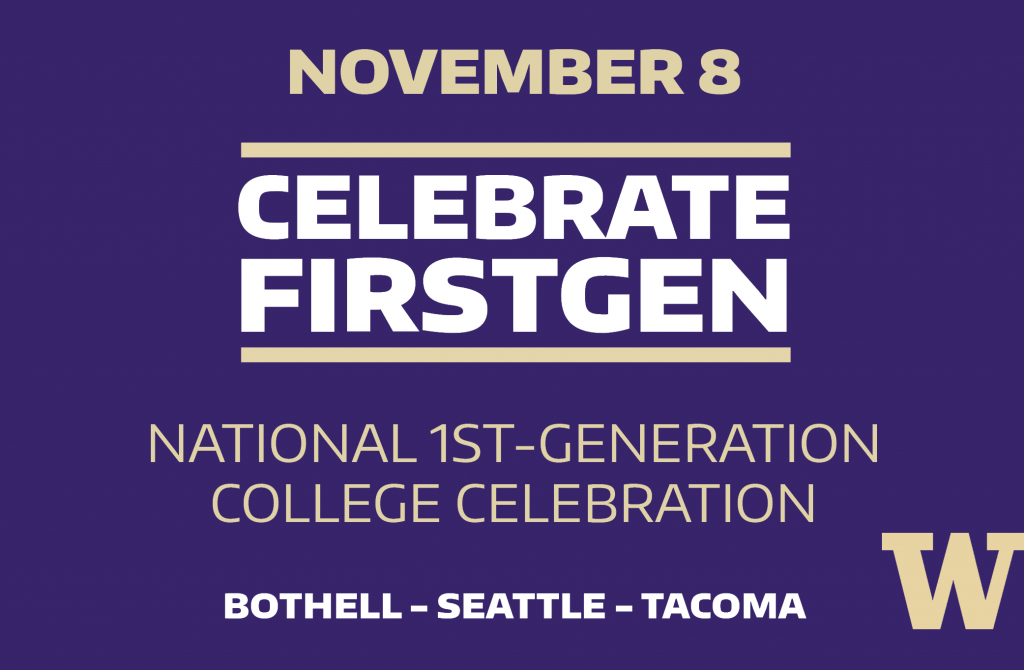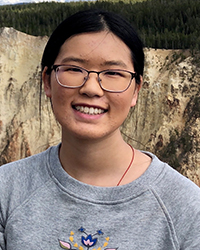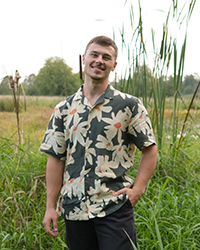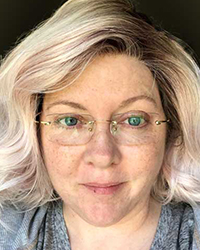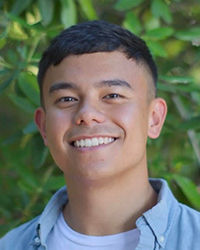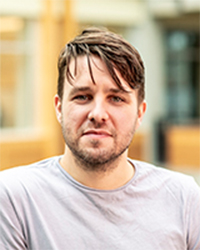In honor of today’s National First-Generation College Celebration, the Allen School continues our annual tradition of spotlighting some of our own first-gen community members and what the opportunity to pursue a bachelor’s degree means to them. As the first in their families to navigate the complicated college application process and the array of internship, study abroad and extracurricular activities, these students are using perseverance, resilience and drive to figure it all out on their own or find the resources to help them. Here’s a glimpse of what they’ve experienced and learned along the way.
David Cueva Cortez, undergraduate student
David Cueva Cortez, of Toppenish, Washington, is a senior studying computer science and dance and serves as vice president of GEN1, a group for first-gen students in the Allen School. Both of his parents emigrated from Mexico, and he grew up in a family of seasonal and migrant agricultural workers who picked fruit in various orchards around eastern Washington, from the Tri-Cities to Wenatchee and everywhere in between. Despite his family traveling each week to a different town to work for another employer, his parents still found time to support his desire to continue his academic studies at the University of Washington.
Allen School: What made you decide to pursue a college degree, and how did you navigate the system?
David Cueva Cortez: My family has made many sacrifices so that I could take advantage of the opportunities not present in Mexico and create a better life for myself and generations to come. Their encouragement to complete my college degree, and my own desire not to work in the fields like them, pushed me to where I am today. For me, getting involved with different kinds of organizations helped me navigate the college system. Being involved in cultural organizations helped me celebrate and remember my roots and major-related organizations helped me meet new people and expand my network.
Allen School: Why did you pick UW, and what interested you in computer science?
DCC: First and foremost I wanted to get out of the Yakima Valley and get a feel for a new town and environment. The desire to be in a city and UW being one of the best engineering schools in a tech-driven city made it a no-brainer for me. I am interested in computer science because of the tools it provides you for problem solving and creating new things. I often draw parallels to construction where you are given all these tools to create something that is going to impact someone. In my case, though, I was really drawn to computers — seeing how code could create all these marvelous things made me more inclined to try it and eventually it just stuck with me.
Allen School: What does being a first-generation student mean to you?
DCC: It means being able to take my struggles and life experiences as a non-traditional student to use as fuel to make a change for not only myself but others. Knowing that I am a trailblazer in uncharted territory alongside my peers who share this first-gen experience is what allows us all to succeed despite the odds.
Allen School: What is your favorite part about being at the Allen School?
DCC: I would have to say all the people I have met. People at the university come from rich and diverse backgrounds, and I always enjoy talking with them and listening to their stories. I’ve made many friends here who I’ve known since freshman year and have created so many wonderful memories in and out of school with them.
Wen Qiu, (B.S. ‘21) B.S./M.S. student
Wen Qiu, a student in the B.S./M.S., immigrated from China with her parents about six years ago. She discovered her passion for computer science after joining the robotics team in high school and taking a computer science course. Her parents were her strongest advocates and supported her choice to study computer science at the Allen School.
Allen School: Why did you pick UW and what interested you in computer science?
Wen Qiu: UW was one of my top options since it is in-state and has a prestigious computer science program. Getting a chance to take a computer science course in high school changed my life, and I was fortunate enough to have great teachers, mentors and professors who have helped me along the way. Before I entered college, I viewed computer science as a medium of creativity, but ever since I became a teaching assistant, I have been more intrigued by computer science education as a field. This is my seventh quarter as a TA and I hope that by improving my teaching skills, I can bring a positive impact on my students and show them computer science is a valid path to pursue. No matter what identity they are and how much prior experience they have coming into the class, they still belong and can thrive in this field.
Allen School: What made you decide to pursue a college degree, and how did you navigate through the college system?
WQ: Since both of my parents went to college in China, I had little insight into how colleges work in the US. The STARS program helped ease that transition and find a community within the huge UW campus. I also learned about more opportunities over time by building good relationships with my professors and chatting with my peers in the major.
Allen School: What does being a first-generation student mean to you?
WQ: For me, being a first-generation student means recognizing and being proud of the efforts I put into my coursework and personal growth. It also means being open to sharing the lessons I’ve learned with others and giving back to the community that supports and encourages me to become who I am today.
Allen School: What is your favorite part about being at the Allen School?
WQ: My favorite part about being at the Allen School is the CS education community. There are a lot of faculty members and TAs who genuinely care about teaching and making computer science more inclusive to everyone, and I am excited to be a part of that effort.
Tim Mandzyuk, (B.S. ‘21) B.S./M.S. student
Tim Mandzyuk is a student in the Allen School’s combined B.S./M.S. program. He is the second youngest of six children, and one of only two born in the U.S. His parents grew up without hot water or a flushable toilet in western Ukraine, then part of the Soviet Union. There, his grandparents spent years in prison for their religious beliefs. When the Soviet Union collapsed, his parents moved to the United States, where he was born soon after. Mandzyuk didn’t have much growing up, but his parents worked hard to provide for their children and pushed them to do the same. With their support, he started his pursuit of a college education his junior and senior years of high school, enrolling in the Running Start program at Everett Community College (EvCC). He graduated high school as valedictorian and went on to earn his Associate’s in general engineering at EvCC, graduating with a 4.0 GPA, before joining the Allen School’s computer engineering program. While he struggled during his first quarter at UW, navigating the challenging courses, living on his own for the first time and feeling like an imposter, he enrolled in the Allen School’s transfer student seminar, made friends and eventually realized he was where he belonged.
Allen School: What made you decide to pursue a college degree, and how did you navigate the system?
Tim Mandzyuk: Learning and connecting with others is fun for me. I grew up playing piano, I ran cross country and track in high school and college and tried to get myself out there in many other ways just to be involved. Naturally, college was the next step in the process. I never had this notion of what a “big name” school was and what it “meant” to get into certain universities. This is a cultural difference between Ukraine and the U.S. In Ukraine, there are no sports teams or prestigious universities, mainly because most people end up working on their farms or doing construction. Because of this, my parents didn’t care if I went to college or not, they just wanted me to be successful. I knew I wanted to go to college, and that meant I needed to figure out how to make that happen on my own. Scholarships, applications, emails, you name it, I was figuring it out. I have learned a lot through trial and error, but most of my knowledge comes from a supportive community. My advisors, teachers, family and friends were always there to support me and help me along the way. People would go out of their way to ensure I was able to figure out x, y and z. Truly, without the people in my life and their guidance, I would not be where I am today. I am so grateful for them all.
Allen School: Why did you pick UW, and what interested you in computer engineering?
TM: Growing up just north of Seattle, I always thought of UW as the ideal university. I knew that one day I wanted to go to UW, but figuring out what I wanted to study was a little harder. During my time at EvCC, I took a circuit class where we used arduinos to make a robot. I thought it was the coolest thing, and from that moment I had my mind set on computer engineering. This degree fit me perfectly because it had a nice balance between hardware and software, where I got the best of both worlds. Now here I am, studying at my dream school with a degree in computer engineering and now working on my CSE degree in the B.S./M.S. program.
Allen School: What does being a first-generation student mean to you?
TM: Being a first-generation college student means breaking boundaries. I am the first person in my family to ever attend graduate school. To me, continuing my education is more than learning, it’s about proving that people in my family can do it too. That we are not limited by what our family has done in the past, but that we too can pave new roads that lead to success.
Allen School: What is your favorite part about being at the Allen School?
TM: My favorite thing about the Allen School is the supportive community. When I first came to UW, I was shocked at how many resources there were for me to get help in so many ways, whether that be in classes, with future planning or anything related to my education and time here. I have also enjoyed the education here. It feels like I have learned more in the past two years in the Allen School than I have my entire life before that.
Shari Maginnis, PMP student
Shari Maginnis is a student in the Allen School’s Professional Master’s Program. After 30 years working as a software engineer she might not be a traditional college student, but the love of learning that her parents instilled in her brought her to the Allen School. While higher education was not a part of her parents’ family culture, they were self-motivated and voracious for knowledge. Her mother sewed clothes, curtains and furniture covers, while her father learned to fix “everything.” In the 1970s she helped him assemble their first PC, and in the 80s the two spent hours transcribing and then debugging programs from coding periodicals. When her family moved to Davis, California, home of University of California Davis, all of her high school classmates were college-bound. Maginnis loved school and ended up winning a musical talent scholarship to pay for her freshman year. When her father died suddenly of a heart attack, Maginnis changed gears by refocusing her studies on computer science and working as a coder to pay for her education.
Allen School: What made you decide to continue your pursuit of education?
Shari Maginnis: I worked in that same job for a small company for many years until we were purchased by a well funded dot-com startup. The company culture changed and my professional world expanded, raising the question, “What’s next for me?” If I could do anything in the world, what I wanted most was to go back to school. I began researching options for advanced education and found a perfect fit with the Allen School PMP program. A challenging, high-profile program, focused on working computer professionals and prominent in the local tech community? It’s like the program was created with me in mind — and after two years, I still feel this way.
Allen School: What does being a first-generation student mean to you?
SM: Looking back on my educational career, there is a real hurdle present for first-generation students. Success in higher education is a learned skill which I acquired through tedious trial and error but also absorbed from my community of friends. I owe so much to the powerful examples set by my friends who were making it work alongside me the whole way. Even now, I’m still figuring it out and I’m still learning from my friends.
Allen School Any advice for first-generation students?
SM: I’ve found that hard problems often have many possible solutions. Don’t stop finding solutions until you’ve found one that is a good fit for you. I learned to seek out the people that were making it look easy and make their strategies mine, too. Ask questions. Almost everyone wants you to be successful, so find ways to make it easy for them to help you. Accomplishments, even small ones, are addictive, and aligning your goals with your passions fills your accomplishments with joy as well as satisfaction.
Allen School: What is your favorite part about being at the Allen School?
SM: There is something about a community dedicated to the pursuit of knowledge — it fills me with joy and wonder just to be on the UW campus. I still text campus snapshots to my mom, and she tells me that my father would be proud. That means everything to me, even now.
EJ Pinera, staff
EJ Pinera, the Allen School’s student leadership development coordinator, was born and raised in south Seattle. His mother grew up in a lower income home in west Seattle, and his father immigrated to the U.S. from the Philippines at the age of 12. The two had Pinera when they were 19 years old and instilled in him the value of working hard and studying in order to gain access to higher education, because they could not afford it. Pinera said that because his parents and grandparents didn’t know how to navigate higher education, he researched a way to stand out in the college application process. Joining programs like UW’s Upward Bound and Summer Search and serving as the associated student body president and class valedictorian earned him a full scholarship to Seattle University, where he graduated cum laude with a bachelor’s in psychology. Pinera’s mother went back to school part-time when he started college, and the two earned their degrees in the same weekend.
Allen School: What does being a first-gen student mean to you?
EJ Pinera: While I am humbled to even say I have a college degree, the journey was really tough. I encountered a lot of peers who came from upper-mid socioeconomic backgrounds, and sometimes it felt tough sitting in the same environments. I found myself sitting in classes with folks who easily pulled out Macbook Pros for class, while I brought out an affordable baseline laptop. I overheard peers who would brag about the international trips their parents sent them on during breaks, while for me it was tough finding funds to set aside for simple things like books. Oftentimes folks think first-gen means you mainly don’t understand the college landscape, but it usually includes a lot of racial and classist undertones that folks from privileged backgrounds don’t have to deal with.
Allen School: Did being a first-gen student influence your career?
EP: Absolutely. Before I started on the Diversity & Access Team, I worked at Rainier Scholars, a nonprofit based in south Seattle. I was an academic counselor for students of color in high school and college, and I absolutely loved supporting young, brilliant and gifted first-gen students on their journey to college.
Allen School: What advice do you have for future first-gen students?
EP: The biggest thing that got me through college, and the thing supporting me beyond, is this: take advantage of resources, even when you feel like you don’t deserve to — imposter syndrome is a very real thing, and insecurity itself can hold you back from a lot. Next time you’re standing outside of career services or afraid to email the study abroad office because you feel worried that you’d be judged for being clueless or undeserving due to financial aid, remind yourself that you are worthy and you absolutely deserve every opportunity that comes your way.
Allen School: What does working at the Allen School mean to you?
EP: Working at the Allen School gives me a great opportunity to support the next generation of leaders who will influence the tech world, which is growing rapidly. I get to continue working in a student-support role now as the student leadership development coordinator, and I am enjoying every moment of supporting our student groups. With regard to first-gen especially, I am very passionate about supporting GEN1 and our students from minority backgrounds.
Kurtis Heimerl, professor
Allen School professor Kurtis Heimerl grew up with an enlisted Air Force staff sergeant father and a mother who worked retail as the family bounced around military bases. When Heimerl was eight, they settled in Alaska. He has two older sisters; the eldest, Michelle, was the driving force behind his college career. She was the first to go to college and made sure Heimerl did so as well. After attending school in Idaho, she settled into a job in Seattle and urged her brother to enroll in UW so that he would have familial support nearby. Since his high school didn’t have great college counselors and his parents didn’t have any college experience, Heimerl said Michelle’s guidance was critical for him to navigate the system — when he signed up too late for classes she told him about FIG, a special interest group for first-year students. Heimerl earned his bachelor’s in computer engineering from UW in 2007 and completed his Ph.D. at the University of California, Berkeley in 2013.
Allen School: Why did you decide to pursue your Ph.D. and then become an educator?
Kurtis Heimerl: I did a bunch of internships and just realized that working on the problems of big software companies wasn’t for me. I was on a team at Amazon doing really amazing service-oriented architecture stuff, developing a tier-0 service discovery solution. This was, in retrospect, some of the coolest stuff a systems person can work on in industry. It just didn’t grab me. My Ph.D. allowed me to pursue problems I thought were interesting, rather than those hoisted upon me by my manager.
Allen School: What does being a first-gen student mean to you?
KH: I think my experience has been that I don’t get a lot of what others implicitly understand. This isn’t necessarily entirely bad; I think there were a lot of situations where if I had more context I’d get that what I was trying to do was extremely unlikely, but it worked out anyhow. There are other elements as well that I still struggle with, though I’m not certain if they are cultural or related to being first-generation. For example, I had a tendency to believe that a lot of the world is outside of my reach as it’s only stuff I saw on TV or whatever. Realizing that these opportunities are for you, you’re there, and you’re there for a reason took me a long time to understand.
Allen School: What do you like most about working at the Allen School?
KH: Freedom, nice office, microwave is near me. More truthfully, the University of Washington, and specifically the Allen School, were so foundational in me finding my path that it’s simply a joy to be able to give back to these institutions. I often tell students that to be truly successful you have to “drink the Kool-Aid” wherever you are. It’s really hard to be at Google or Facebook or whatever and not truly believe in their mission. You go in, you write code, but there’s no passion, and that lack of passion makes it hard to climb up the ladder and succeed. My favorite thing about working at UW is that I deeply believe in the mission and purpose of this institution, and that lets me be successful.
Allen School: What advice do you have for future first-gen students?
KH: I think everyone’s journey is unique so it’s hard to generalize. I think the advice I needed and received during my time here is that all paths truly are available. It may not seem that way; it may seem like you’d be lucky to end up at company X for 30 years or that only a certain group of others with some skills you don’t have can do a thing, but it’s not true. You can go to grad school, start a company or become a director. Or, if you really want, work at company X for 30 years. You get to make that choice. I figured this out by watching people I considered my peers taking paths I hadn’t considered viable for someone like me. I think a smarter person could see that on their own.
We are grateful to all of our first-gen students, faculty and staff for the many ways they enrich our campus and school community!
Learn more about UW’s first-generation celebration here.


